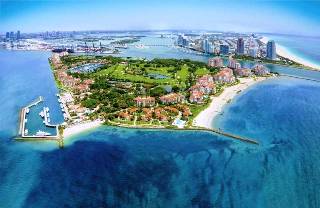The homeowners’ association for Fisher Island, the private paradise near Miami that recently bought enough COVID-19 antibody tests for all of its residents and employees, is considering applying for a loan through the federal government’s massive stimulus program to bail out small businesses.
|
Fisher Island |
The loans are intended
for businesses with 500 employees or fewer to cover payroll
costs, interest on mortgage obligations, rent and utilities,
according to the U.S. Treasury. The government hasn’t been
factoring in the financial condition of a given business in
distributing the funds, asking only for a company’s average
monthly payroll and number of employees, plus some other
basic information.
The first round of paycheck protection funding allocated
$350 billion to small businesses. The U.S. Senate approved a
deal Tuesday that would replenish that pot with an
additional $310 billion, and it’s likely to be approved by
the House of Representatives later this week.
On Fisher Island, the community association’s chief
responsibility is to “manage, maintain and improve the
common areas,” according to its website. That’s a labor
intensive task for employees on a 216-acre island full of
pristine swimming pools and tennis courts.
Ana Tinsly, a spokeswoman for SEIU Florida, said the union
represents about 130 groundskeepers and security workers who
are employed directly by the association. So far, she said,
it seems the group has been treated well during the
pandemic. There haven’t been any layoffs, Tinsly said, and
the association has given workers extra paid days off and
has been mindful about social distancing practices.
“Honestly, no complaints,” Tinsly said.
Average annual income among the island’s residents was $2.5
million in 2015 — the highest of any ZIP code in America,
according to Bloomberg. The homeowners’ association, which
oversees more than 20 smaller condo associations, is a
separate entity from the ritzy Fisher Island Club, where
memberships cost about $250,000.
Fisher Island residents aren’t immune to broader economic
forces. In January 2009, during the Great Recession, the New
York Times reported that about a quarter of the island’s
nearly 700 condos were up for sale and that sellers were
cutting prices.
But even then, the chief executive of the homeowners’
association said it had a balanced budget and ended 2008
with a surplus.
“None of the associations on the island is in financial
peril,” former association CEO Mark James told the Times.
Fisher Island made international headlines last week after
the Herald reported it had worked out a deal with the
University of Miami Health System to make rapid blood tests
for COVID-19 antibodies available to the 800 or so families
that live there, and to all the workers who maintain the
property and patrol its streets. The news sparked
frustration from some as the availability of testing for the
novel coronavirus, including antibody tests, remains limited
nationwide.
The island purchased 1,800 tests at $17 each — for a total
of $30,600 — which were administered by doctors from a
UHealth clinic stationed on the island. The cost came out of
the island’s annual operating budget, a spokeswoman said.
Although the tests produce results in about 15 minutes, they
aren’t recommended to diagnose COVID-19 because it can take
weeks after someone has been infected to detect antibodies
in the blood stream, causing some false negatives. Still,
the tests are valuable in plotting the spread of the disease
and helping health experts determine who has already fought
it off.
The testing on Fisher Island was expected to be completed
last week, according to a Fisher Island spokeswoman, and
UHealth planned to conduct contact tracing to determine if
there has been community spread of the disease on the
island.
Lisa Worley, a spokeswoman for UHealth, said Monday that any
conclusions drawn from the testing will not be made public
for “several weeks.”
